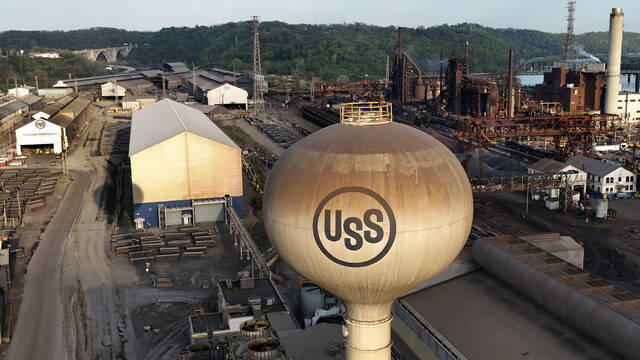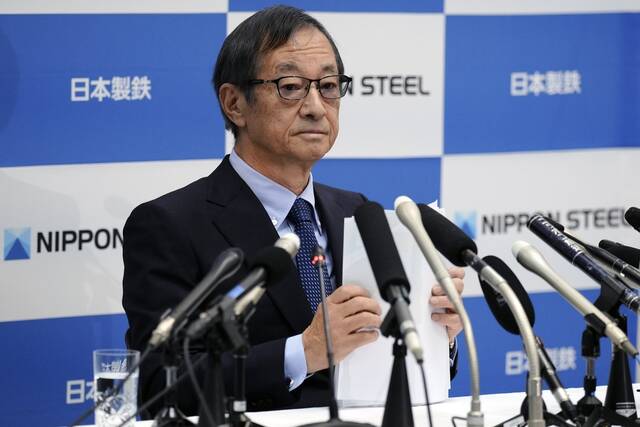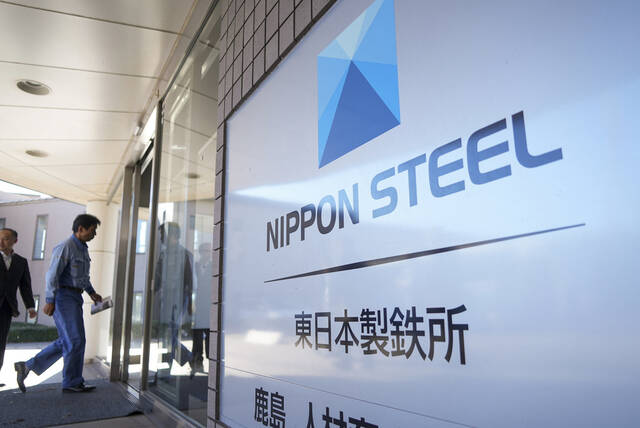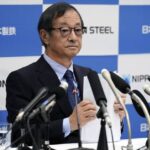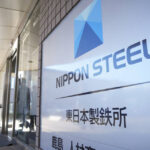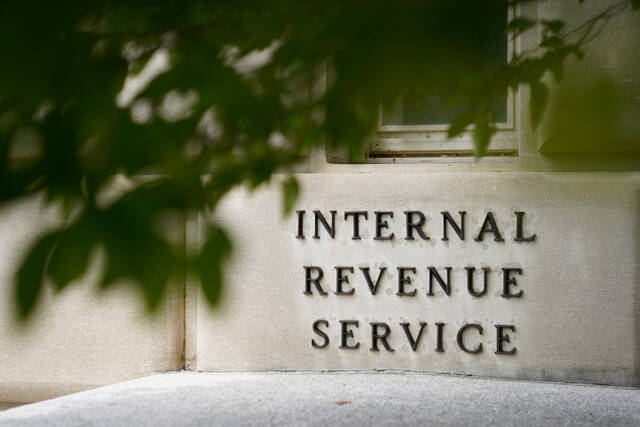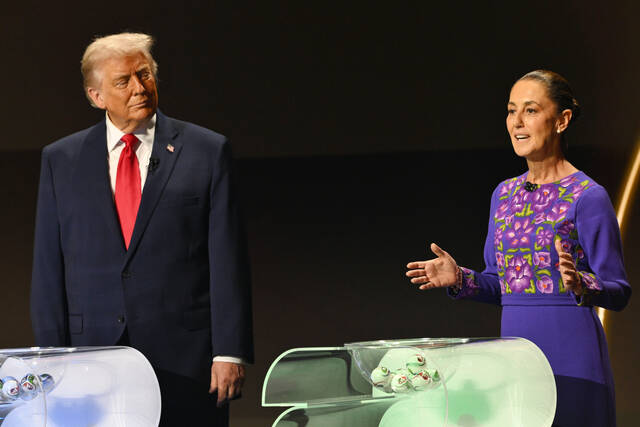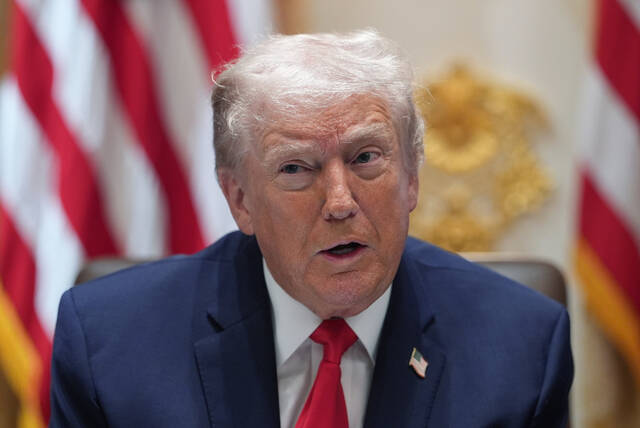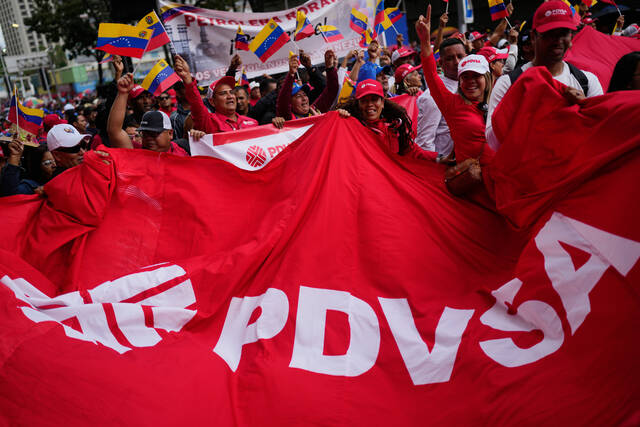U.S. Steel and Nippon Steel are suing to challenge the Biden administration’s decision to block a proposed deal for the Japanese company to acquire the Pittsburgh-based steelmaker for nearly $15 billion.
At the same time, the companies also filed suit Monday in Pittsburgh against Cleveland-Cliffs Inc., the company’s CEO and union president, alleging they are attempting to monopolize the steel market and undermine U.S. Steel’s vitality in an effort to acquire the company under distressed circumstances.
The legal challenges follow months of speculation over whether the federal government would allow Nippon Steel to obtain U.S. Steel in an all-cash deal.
“There is no reason or need to give up,” Nippon Chief Executive Eiji Hashimoto said. “We are convinced it’s clearly beneficial for both nations.”
While acknowledging the effort may take time, he stressed the companies’ latest legal action in the U.S. was a key development.
One lawsuit, filed Monday in the U.S. Court of Appeals for the District of Columbia, alleges Biden blocked the merger to serve his personal political agenda — announcing in March that he would do so — and that the Committee on Foreign Investment in the United States, known as CFIUS, purposely conducted a sham investigation to allow that to happen.
“The president’s decision had nothing to do with national security: How could it when the national security evaluation had not even started?” the lawsuit states. “The public record makes clear that the president’s decision was based on illegitimate and self-serving political considerations — a clear violation of the entire CFIUS process, which was created as an apolitical safeguard to protect national security.”
The complaint alleges CFIUS “deviated dramatically” from its usual review process to reach Biden’s predetermined goal to block the merger.
It asks the court to set aside Biden’s order and the CFIUS decision and require a review of the deal that is consistent with the law.
“Petitioners are confident that a fair review, untainted by the president’s political agenda, will conclude that any possible national security concerns are addressed fully by the proposed national security agreement or could be addressed by a revised agreement — and that, therefore, they will be able to consummate the transaction and benefit petitioners’ stockholders, U.S. Steel employees and America’s national security,” the lawsuit said.
As of Dec. 31, 2023, U.S. Steel had net earnings of $895 million and almost 22,000 employees, including nearly 14,000 in the United States.
The lawsuit said U.S. Steel does not produce the steel used in building America’s infrastructure or military equipment and that its largest market is for automotive steel.
Nippon Steel, headquartered in Tokyo, employs 28,000 people in Japan and, with its subsidiaries, 106,000 worldwide.
Nippon employs about 4,000 people in the United States, where it has been operating since 1972.
Nippon Steel had promised to invest $2.7 billion in U.S. Steel’s aging blast furnace operations in the Mon Valley and in Gary, Ind. It also vowed not to reduce production capacity in the United States over the next decade without first getting U.S. government approval.
But on Friday, Biden said he would block the takeover — after federal regulators deadlocked on whether to approve it — because “a strong domestically owned and operated steel industry represents an essential national security priority. … Without domestic steel production and domestic steelworkers, our nation is less strong and less secure,” he said in a statement.
The lawsuit alleges the president may block a transaction only if there is credible evidence it threatens to impair national security and there is no other way to counter the threat.
According to the lawsuit, since the enactment of the Defense Production Act, the president has blocked only eight other transactions, and none involving an allied nation such as Japan.
Seven of the blocked mergers involved Chinese companies, and one involved Singapore.
The lawsuit also lists several large transactions involving Japanese companies merging with American industries without government interference, including Toshiba Corp.’s 2006 acquisition of Westinghouse Electric for $5.4 billion.
“From the outset of the process, both Nippon Steel and U.S. Steel have engaged in good faith with all parties to underscore how the transaction will enhance, not threaten, United States national security, including by revitalizing communities that rely on American steel, bolstering the American steel supply chain, and strengthening America’s domestic steel industry against the threat from China,” the companies said in a statement Monday. “Nippon Steel is the only partner both willing and able to make the necessary investments.”
The lawsuit, according to a statement from Nippon and U.S. Steel, alleges Biden blocked the merger to fulfill a promise made to union leadership for their endorsement in the presidential election. Biden leaves the White House this month.
The complaint alleges the process used by CFIUS to review the deal was purposely steered to match the predetermined results sought by the Biden administration.
CFIUS failed to reach consensus on the possible national security risks of the deal last month and sent a long-awaited report on the merger to Biden. He had 15 days to reach a final decision.
Suit against Cleveland-Cliffs
In the separate federal lawsuit filed in Pittsburgh, Nippon and U.S. Steel named Cleveland-Cliffs, as well as CEO Lourenco Goncalves and David McCall, the head of the steelworkers union, accusing them of “engaging in a coordinated series of anticompetitive and racketeering activities” to block the deal.
In 2023, before U.S. Steel accepted the buyout offer from Nippon, Cleveland-Cliffs offered to buy U.S. Steel for $7 billion. U.S. Steel turned down the offer and later accepted the nearly $15 billion all-cash offer from Nippon.
According to the lawsuit, Cleveland-Cliffs lowballed its offer and attempted to bully U.S. Steel into taking it.
The complaint alleges Goncalves, in collusion with the U.S. Steelworkers, maneuvered to prevent any party other than Cleveland-Cliffs from acquiring U.S. Steel and to damage the Pittsburgh manufacturer’s ability to compete.
It includes claims that the defendants “spearheaded a campaign of lies and pressure tactics, while leveraging their unlawful agreement to force U.S. Steel to merge with Cliffs and prevent U.S. Steel from being sold to anyone else.”
The lawsuit alleges Cleveland Cliffs knows a merger between U.S. Steel and Nippon would create a formidable competitor.
“Cliffs’ threat to U.S. Steel is plain: merge with Cliffs or be murdered.”
The lawsuit alleges a “years-long quest” by Cleveland-Cliffs to monopolize steelmaking and seeks an injunction.
According to the complaint, the merger with Nippon Steel would allow U.S. Steel to invest in its facilities and increase production capacity.
“Perhaps no one stands to benefit more from the merger than the citizens of Pennsylvania and, in particular, the workers in the Mon Valley,” the lawsuit states.
U.S. Steel would keep its headquarters in Pittsburgh, and Nippon’s North American headquarters would be located here, as well. The lawsuit also said U.S. Steel employees would receive $5,000 closing bonuses, and the companies pledged there would be no layoffs nor closures of facilities in operation into 2026.
“Because of these commitments, and because they recognize that the fate of the Mon Valley hangs in the balance, the rank-and-file members of the local USW union that represents Mon Valley Works have publicly bucked the International Union’s leadership by holding vocal rallies in support of the merger,” the lawsuit states.
However, President-elect Donald Trump last month underscored his intention to block the deal, and pledged to use tax incentives and tariffs to strengthen the iconic American steelmaker.
Trump had vowed early in the presidential campaign that he would “instantaneously” block the deal, and he reiterated that sentiment in a post on his Truth Social platform in early December.
A long legal road
Max Laun, a law professor at the University of Pittsburgh, said the legal path for U.S. Steel and Nippon Steel may not be an easy one.
“The real issue is that the president is accorded wide authority to make policy decisions where there’s any grounding in national security,” he said. “It probably isn’t enough just to say, ‘Oh, it’s a national security concern.’ There probably needs to be more than that. But in general, courts have given the administration, or any administration, a fair amount of deference when it comes to an invocation of national security.”
Laun said the steel companies might have had a stronger case if the Committee on Foreign Investment in the United States had advised the president to accept the deal and Biden had ignored their advice.
Instead, it failed to render a determination one way or the other.
“Had the committee said yes and the Biden administration blocked it, you might have a stronger case,” Laun said.
If U.S. Steel wins the initial legal challenge, Laun said, the administration is likely to appeal. Trump, poised to take office later this month, likely would do the same.
Staff writer Julia Burdelski and The Associated Press contributed to this report.
Related:
• 'Steel is all around us:' Pittsburghers reflect on region's industrial arc in wake of blocked U.S. Steel deal• Devastation, relief on spectrum of emotions for stakeholders in U.S. Steel sale after Biden's block
• U.S. Steel, Nippon say Biden's decision to block sale was 'political'
• With U.S. Steel deal axed, economic experts question future of Mon Valley steelmaking
• What they're saying about it: U.S. Steel-Nippon deal blocked


